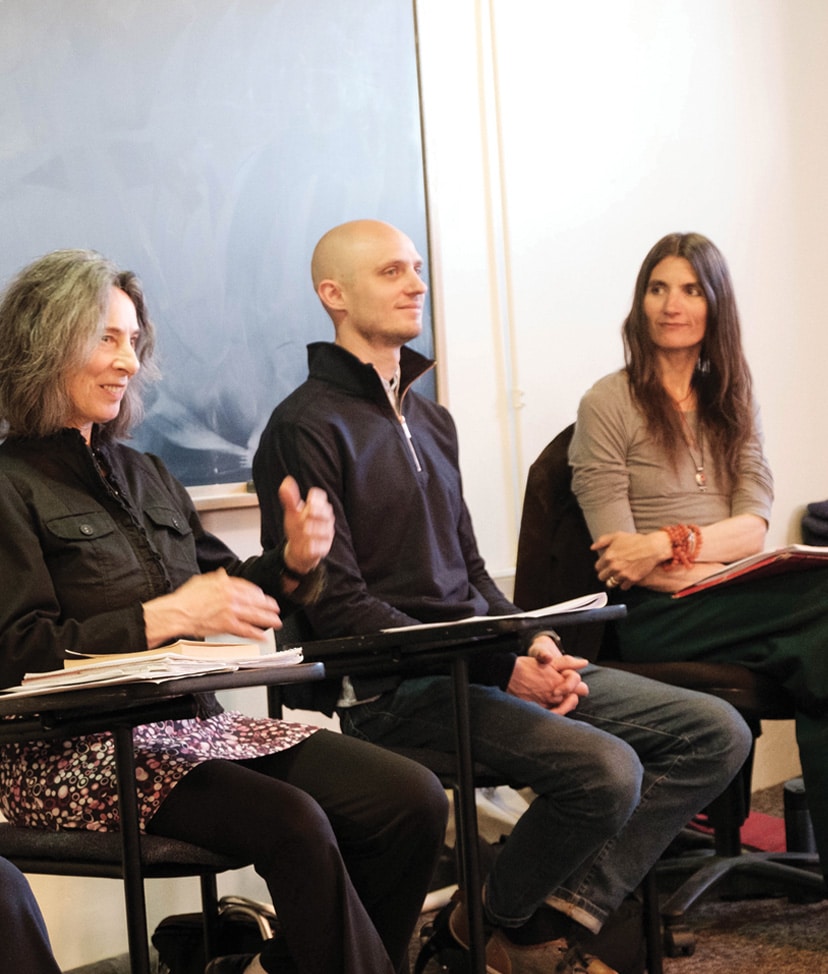The Science
Contemplative practice, meditation, and mindfulness are ancient, from prehistory to the foundations of every major religion and modern practice.
In the 21st century, an expanded neuroscience as a field of study has investigated contemplative practices for their medical and psychological benefits. Based on brain scans and large-scale research, there is compelling evidence that mindfulness techniques and meditation can increase attention and focus, strengthen clarity and understanding, and enhance the presence of positive emotions such as empathy and compassion.
Contemplative Science at Naropa University
Here at Naropa University, a number of faculty are pursuing programs of research on the benefits of contemplative practice and training. The Cognitive and Affective Science Lab (CASL), directed by Naropa faculty member Dr. Jordan Quaglia, uses a wide variety of methods—from neuroscience to smartphone-based surveys to virtual reality—to study topics such as mindfulness, compassion, and lucidity.
In one study, Dr. Quaglia used virtual reality to examine whether people could overcome their fear of heights through lucidity—that is, being aware that their fear was rooted in illusion, rather than being true to reality. More recently, Dr. Quaglia studied potential person and social benefits Naropa’s own eight-week Mindful Compassion Training. The study tracked experiences of compassionate care in daily social interactions. Analyses are ongoing, but preliminary findings have revealed that people commonly experience combined forms of compassionate care—care for both themselves and others—in daily life. Moreover, these combined compassion experiences predict higher social and emotional well-being, underscoring the potential significance of examining combined compassion as a training outcome, apart from self- or other-oriented compassion alone. You can read more about the research happening in CASL here: www.CASLaboratory.org
Contemplative Practice Increases Attentiveness
Scholar and Naropa collaborator Amishi P. Jha, PhD, Associate Professor of Psychology at University of Miami and principal investigator of the Jha Lab, has shown a link between mindfulness and increases in attention and focus.
Jha asserts that humans spend as much as 50 percent of their time in a state of involuntary, self-focused distraction that called “mind wandering.” Mind wandering can lead to decreased perception and productivity, and is often associated with negative emotional states.
Her research shows that people who engage in mindfulness practices, even for a short while, show a marked increase in their ability to remain focused and complete simple tasks successfully.
People who engage in mindfulness are more able to employ the wandering mind’s more productive cousin, “constructive reflection.” Constructive reflection is the thinking process by which we gain insight, clarity, and a sense of purpose. By engaging in contemplative practice, Naropa students have the potential to strengthen their focus and attentiveness and become better able to engage in constructive learning.
Contemplative Practice Creates Positive Emotions
Friend of Naropa, Richard Davidson, PhD, William James and Vilas Professor of Psychology and Psychiatry at the University of Wisconsin-Madison, is showing through his research in neuroplasticity that people can learn empathy and compassion as skills, just as they can learn to play a musical instrument or train in athletics. He further asserts that meditation can increase positive emotions such as compassion and can bring a greater sense of personal happiness.
Positive emotions have been linked with better health, longer life, and greater well-being in numerous scientific studies. On the other hand, chronic anger, worry, and hostility increase the risk of developing heart disease, as people react to these feelings with increased blood pressure and stiffening of blood vessels.
Davidson’s research indicates that meditation, like what is included in Naropa’s contemplative approach, may lead to increased positive emotions, which leads to mental and physical well-being. There are also benefits in creative learning and the blossoming of wisdom.

Naropa's Recent Contributions to Contemplative Science
Most who know of Naropa University are likely familiar with its extraordinary history, including its role as a key origin point of the broader mindfulness movement as we know it today. This view rightfully emphasizes Naropa’s momentous past, but what is sometimes less widely appreciated is the many ways in which Naropa continues to contribute to the burgeoning mindfulness movement throughout society— significantly shaping its present and future too. There are many routes through which this is occurring, from contemplative education to mindfulness-based psychology to mutually enriching blends of social justice and contemplative practice.



